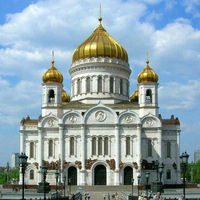Не думайте, что Я пришел принести мир на землю; не мир пришел Я принести, но меч (Мф. 10:34)
Опять Спаситель предсказывает великие скорби, притом гораздо многочисленнейшие, – и что ученики могли бы Ему возразить, о том Сам говорит им наперед. Именно, чтобы слыша слова его, они не сказали: Итак, Ты пришел для того, чтобы погубить нас и наших последователей, и возжечь на земле всеобщую брань? – Он Сам предупреждает их, говоря: Не мир пришел Я принести на землю. Как же Сам Он заповедовал им, входя в каждый дом, приветствовать миром? Почему же, равным образом, ангелы воспевали: Слава в вышних Богу, и на земле мир (Лк. 2:14)? Почему также и все пророки благовествовали о том же?
Потому что тогда особенно и водворяется мир, когда зараженное болезнью отсекается, когда враждебное отделяется. Только таким образом возможно небу соединиться с землею. Ведь и врач тогда спасает прочие части тела, когда отсекает от них неизлечимый член; равно и военачальник восстановляет спокойствие, когда разрушает согласие между заговорщиками. Так было и при столпотворении. Худой мир разрушен добрым несогласием, – и водворен мир. Так и Павел поселил раздор между согласившимися против него (Деян. 23:6). А согласие против Навуфея было хуже всякой войны (3 Цар. 21).
Единомыслие не всегда бывает хорошо: и разбойники бывают согласны. Итак, брань была следствием не Христова определения, а делом воли самих людей. Сам Христос хотел, чтобы все были единомысленны в деле благочестия; но как люди разделились между собою, то и произошла брань. Впрочем, Он не так сказал. А что же говорит? Не мир пришел Я принести, – чем самым утешает их. Не думайте, говорит, что вы виноваты в этом: Я это делаю, потому что люди имеют такие расположения. Итак, не смущайтесь, как будто эта брань возникла сверх чаяния. Для того Я и пришел, чтобы произвести брань; такова именно Моя воля.
Итак, не смущайтесь тем, что на земле будут брани и злоумышления. Когда худшее будет отсечено, тогда с лучшим соединится небо. Так Христос говорит для того, чтобы укрепить учеников против худого мнения о них в народе. Притом, не сказал: войну, но, что гораздо ужаснее – меч. Если сказанное слишком тяжко и грозно, то не дивитесь. Он хотел приучить слух их к жестоким словам, чтобы они в трудных обстоятельствах не колебались. Поэтому и употребил такой образ речи, чтобы кто не сказал, что Он убеждал их лестью, скрывая от них трудности. По этой причине даже и то, что можно было бы выразить мягче, Христос представлял более страшным и грозным.
Беседы на Евангелие от Матфея. Свт. Иоанн Златоуст
Не всегда хорошо согласие: бывают случаи, когда хорошо и разделение. Меч означает слово веры, которое отсекает нас от настроения домашних и родственников, если они мешают нам в деле благочестия. Господь не говорит здесь, что должно удаляться или отделяться от них без особенной причины, - удаляться должно только в том случае, если они не соглашаются с нами, а скорее препятствуют нам в вере.
Толкование на Евангелие от Матфея. Блж. Феофилакт Болгарский
Причина несогласия верных с неверными принадлежит грядущей вражде. И поскольку кажется подобающим мир между ними, Он говорит: не думайте, что это означает сохранять [мир] при любых обстоятельствах. Вы должны жить в мире со всеми. Но есть некоторые, кто восстает против вашего мира, и мир с ними вам не следует принимать. Ибо согласие о мире по Богу единственно [в своем роде], и это и есть настоящий мир.
Фрагменты. Аполлинарий Лаодикийский
так и при мире среди нечестивых пребывают неправда и неверие, а вера и правда повержены. Стало быть, Господь послал на землю благое разделение для того, чтобы разорвать злое единение. Ведь все, как добрые, так и злые (то есть возлюбившие зло), все пребывали [ранее] во зле, так же как и те, кто по незнанию блага утверждался во зле: как будто были все вместе заперты в одном доме неверия. Поэтому послал Господь меч разделения между ними, то есть слово истины, о котором говорит апостол: «слово Божие живо и действенно, и острие его острее всякого острейшего меча: оно проникает до самых глубин души и духа, суставов и мозгов, и исследует сердца и помыслы» (Евр. 4:12).
Лопухин А.П.
Не думайте, что Я пришел принести мир на землю; не мир пришел Я принести, но меч
Параллельное место у Луки 12:51, где та же мысль выражена несколько иначе. Лучшим объяснением этого стиха могут служить слова Иоанна Златоуста: “как же Сам Он заповедовал им (ученикам), входя в каждый дом, приветствовать миром? Почему же, равным образом, ангелы воспевали: слава в вышних Богу и на земли мир? Почему также и все пророки благовествовали о том же? Потому что тогда особенно и водворяется мир, когда зараженное болезнью отсекается, когда враждебное отделяется. Только таким образом возможно небу соединиться с землею. Ведь и врач тогда спасает прочие части тела, когда отсекает от него неизлечимый член; равно и военачальник восстановляет спокойствие, когда разрушает согласие между заговорщиками”. Далее Иоанн Златоуст говорит: “единомыслие не всегда бывает хорошо; и разбойники бывают согласны. Так и брань (противостояние) была следствием не Христова определения, а делом воли самих людей. Сам Христос хотел, чтобы все были единогласны в деле благочестия; но как люди разделились между собою, то и произошла брань”.
Толковая Библия.
Опять Спаситель предсказывает великие скорби, притом гораздо многочисленнейшие, – и что ученики могли бы Ему возразить, о том Сам говорит им наперед. Именно, чтобы слыша слова его, они не сказали: Итак, Ты пришел для того, чтобы погубить нас и наших последователей, и возжечь на земле всеобщую брань? – Он Сам предупреждает их, говоря: Не мир пришел Я принести на землю. Как же Сам Он заповедовал им, входя в каждый дом, приветствовать миром? Почему же, равным образом, ангелы воспевали: Слава в вышних Богу, и на земле мир (Лк. 2:14)? Почему также и все пророки благовествовали о том же?
Потому что тогда особенно и водворяется мир, когда зараженное болезнью отсекается, когда враждебное отделяется. Только таким образом возможно небу соединиться с землею. Ведь и врач тогда спасает прочие части тела, когда отсекает от них неизлечимый член; равно и военачальник восстановляет спокойствие, когда разрушает согласие между заговорщиками. Так было и при столпотворении. Худой мир разрушен добрым несогласием, – и водворен мир. Так и Павел поселил раздор между согласившимися против него (Деян. 23:6). А согласие против Навуфея было хуже всякой войны (3 Цар. 21).
Единомыслие не всегда бывает хорошо: и разбойники бывают согласны. Итак, брань была следствием не Христова определения, а делом воли самих людей. Сам Христос хотел, чтобы все были единомысленны в деле благочестия; но как люди разделились между собою, то и произошла брань. Впрочем, Он не так сказал. А что же говорит? Не мир пришел Я принести, – чем самым утешает их. Не думайте, говорит, что вы виноваты в этом: Я это делаю, потому что люди имеют такие расположения. Итак, не смущайтесь, как будто эта брань возникла сверх чаяния. Для того Я и пришел, чтобы произвести брань; такова именно Моя воля.
Итак, не смущайтесь тем, что на земле будут брани и злоумышления. Когда худшее будет отсечено, тогда с лучшим соединится небо. Так Христос говорит для того, чтобы укрепить учеников против худого мнения о них в народе. Притом, не сказал: войну, но, что гораздо ужаснее – меч. Если сказанное слишком тяжко и грозно, то не дивитесь. Он хотел приучить слух их к жестоким словам, чтобы они в трудных обстоятельствах не колебались. Поэтому и употребил такой образ речи, чтобы кто не сказал, что Он убеждал их лестью, скрывая от них трудности. По этой причине даже и то, что можно было бы выразить мягче, Христос представлял более страшным и грозным.
Беседы на Евангелие от Матфея. Свт. Иоанн Златоуст
Не всегда хорошо согласие: бывают случаи, когда хорошо и разделение. Меч означает слово веры, которое отсекает нас от настроения домашних и родственников, если они мешают нам в деле благочестия. Господь не говорит здесь, что должно удаляться или отделяться от них без особенной причины, - удаляться должно только в том случае, если они не соглашаются с нами, а скорее препятствуют нам в вере.
Толкование на Евангелие от Матфея. Блж. Феофилакт Болгарский
Причина несогласия верных с неверными принадлежит грядущей вражде. И поскольку кажется подобающим мир между ними, Он говорит: не думайте, что это означает сохранять [мир] при любых обстоятельствах. Вы должны жить в мире со всеми. Но есть некоторые, кто восстает против вашего мира, и мир с ними вам не следует принимать. Ибо согласие о мире по Богу единственно [в своем роде], и это и есть настоящий мир.
Фрагменты. Аполлинарий Лаодикийский
так и при мире среди нечестивых пребывают неправда и неверие, а вера и правда повержены. Стало быть, Господь послал на землю благое разделение для того, чтобы разорвать злое единение. Ведь все, как добрые, так и злые (то есть возлюбившие зло), все пребывали [ранее] во зле, так же как и те, кто по незнанию блага утверждался во зле: как будто были все вместе заперты в одном доме неверия. Поэтому послал Господь меч разделения между ними, то есть слово истины, о котором говорит апостол: «слово Божие живо и действенно, и острие его острее всякого острейшего меча: оно проникает до самых глубин души и духа, суставов и мозгов, и исследует сердца и помыслы» (Евр. 4:12).
Лопухин А.П.
Не думайте, что Я пришел принести мир на землю; не мир пришел Я принести, но меч
Параллельное место у Луки 12:51, где та же мысль выражена несколько иначе. Лучшим объяснением этого стиха могут служить слова Иоанна Златоуста: “как же Сам Он заповедовал им (ученикам), входя в каждый дом, приветствовать миром? Почему же, равным образом, ангелы воспевали: слава в вышних Богу и на земли мир? Почему также и все пророки благовествовали о том же? Потому что тогда особенно и водворяется мир, когда зараженное болезнью отсекается, когда враждебное отделяется. Только таким образом возможно небу соединиться с землею. Ведь и врач тогда спасает прочие части тела, когда отсекает от него неизлечимый член; равно и военачальник восстановляет спокойствие, когда разрушает согласие между заговорщиками”. Далее Иоанн Златоуст говорит: “единомыслие не всегда бывает хорошо; и разбойники бывают согласны. Так и брань (противостояние) была следствием не Христова определения, а делом воли самих людей. Сам Христос хотел, чтобы все были единогласны в деле благочестия; но как люди разделились между собою, то и произошла брань”.
Толковая Библия.
Do not think that I have come to bring peace to the earth; I did not come to bring peace, but a sword (Matt. 10:34)
Again, the Savior predicts great tribulations, moreover, much more numerous, and that the disciples could object to Him, he himself tells them in advance. Namely, in order to hear his words, they did not say: So, You have come to destroy us and our followers, and to kindle universal warfare on earth? - He himself warns them, saying: I have not come to bring peace to the earth. How did He himself command them, entering every house, to greet the world? Why, in the same way, the angels sang: Glory to God in the highest, and peace on earth (Luke 2:14)? Why did all the prophets also preach the same thing?
Because then the world is especially settled when the infected person is cut off, when the hostile separates. Only in this way is heaven able to unite with the earth. After all, the doctor then saves other parts of the body when an incurable member cuts them off; equally, the military leader restores calm when he destroys the accord between the conspirators. So it was with the crowds. A thin world is destroyed by good disagreement, and the world is settled. So Paul settled a contention between those who agreed against him (Acts 23: 6). And the agreement against Naboth was worse than any war (1 Kings 21).
Unanimity is not always good: and robbers agree. So, the scolding was not the result of Christ's definition, but a matter of the will of the people themselves. Christ himself wanted everyone to be unanimous in their work of piety; but as people were divided among themselves, there was a battle. However, He did not say that. What does he say? It was not I who came to bring peace — what comforts them most. Do not think, says that you are to blame for this: I do this because people have such dispositions. So, do not be embarrassed, as if this scolding arose beyond aspirations. For this I came to make war; that is exactly My will.
So, do not be embarrassed by the fact that there will be battles and misconducts on the earth. When the worst is cut off, then heaven will unite with the best. So Christ speaks in order to strengthen the disciples against the poor opinion of them among the people. Moreover, he did not say: war, but, which is much worse than that - a sword. If the above is too heavy and menacing, then do not be surprised. He wanted to accustom their ears to cruel words so that they would not hesitate in difficult circumstances. Therefore, he used such a way of speaking that no one would say that He convinced them with flattery, hiding difficulties from them. For this reason, even what could be expressed softer, Christ seemed more terrible and formidable.
Conversations on the Gospel of Matthew. St. John Chrysostom
Consent is not always good: there are times when separation is good. The sword means the word of faith, which cuts us off from the mood of family and relatives, if they interfere with our work of piety. The Lord does not say here that he should withdraw or separate from them for no particular reason — he should only withdraw if they do not agree with us, but rather hinder us in our faith.
Interpretation of the Gospel of Matthew. Blj. Theophylact Bulgarian
The reason for the disagreement of the faithful with the infidels belongs to the coming enmity. And since it seems appropriate to have peace between them, He says: do not think that it means preserving [peace] under any circumstances. You must live in peace with everyone. But there are some who rebel against your world, and you should not accept peace with them. For the consent of the world according to God is unique [in its own way], and this is the real world.
Fragments. Apollinaris of Laodicea
in peace, in the midst of the wicked is iniquity and unbelief, and faith and truth are defeated. Therefore, the Lord sent a good separation to the earth in order to break the evil unity. After all, all, both good and evil (that is, those who loved evil), all remained [earlier] in evil, as were those who, out of ignorance of good, affirmed themselves in evil: as if they were all locked together in the same house of unbelief. Therefore, the Lord sent a sword of separation between them, that is, the word of truth about which the apostle speaks: “the word of God is alive and effective, and its tip is sharper than any sharp sword: it penetrates to the very depths of the soul and spirit, joints and brains, and explores the hearts and Thoughts ”(Heb. 4:12).
Lopukhin A.P.
Do not think that I have come to bring peace to the earth; not peace come I bring but sword
Luke 12:51 has a parallel place, where the same thought is expressed somewhat differently. The best explanation of this verse is the words of John Chrysostom: “How did He Himself command them (the disciples), entering every house, to greet the world? Why, in the same way, the angels sang: glory in the highest to God and to the earth peace? Why did all the prophets also preach the same thing? Because then the world is especially settled when the infected person is cut off, when the hostile separates. Only in this way is heaven able to unite with the earth. After all, the doctor then saves other parts of the body when an incurable member cuts off from it; and the warlord restores calm when he destroys the accord between the conspirators. ” Further, John Chrysostom says: “unanimity is not always good;
Again, the Savior predicts great tribulations, moreover, much more numerous, and that the disciples could object to Him, he himself tells them in advance. Namely, in order to hear his words, they did not say: So, You have come to destroy us and our followers, and to kindle universal warfare on earth? - He himself warns them, saying: I have not come to bring peace to the earth. How did He himself command them, entering every house, to greet the world? Why, in the same way, the angels sang: Glory to God in the highest, and peace on earth (Luke 2:14)? Why did all the prophets also preach the same thing?
Because then the world is especially settled when the infected person is cut off, when the hostile separates. Only in this way is heaven able to unite with the earth. After all, the doctor then saves other parts of the body when an incurable member cuts them off; equally, the military leader restores calm when he destroys the accord between the conspirators. So it was with the crowds. A thin world is destroyed by good disagreement, and the world is settled. So Paul settled a contention between those who agreed against him (Acts 23: 6). And the agreement against Naboth was worse than any war (1 Kings 21).
Unanimity is not always good: and robbers agree. So, the scolding was not the result of Christ's definition, but a matter of the will of the people themselves. Christ himself wanted everyone to be unanimous in their work of piety; but as people were divided among themselves, there was a battle. However, He did not say that. What does he say? It was not I who came to bring peace — what comforts them most. Do not think, says that you are to blame for this: I do this because people have such dispositions. So, do not be embarrassed, as if this scolding arose beyond aspirations. For this I came to make war; that is exactly My will.
So, do not be embarrassed by the fact that there will be battles and misconducts on the earth. When the worst is cut off, then heaven will unite with the best. So Christ speaks in order to strengthen the disciples against the poor opinion of them among the people. Moreover, he did not say: war, but, which is much worse than that - a sword. If the above is too heavy and menacing, then do not be surprised. He wanted to accustom their ears to cruel words so that they would not hesitate in difficult circumstances. Therefore, he used such a way of speaking that no one would say that He convinced them with flattery, hiding difficulties from them. For this reason, even what could be expressed softer, Christ seemed more terrible and formidable.
Conversations on the Gospel of Matthew. St. John Chrysostom
Consent is not always good: there are times when separation is good. The sword means the word of faith, which cuts us off from the mood of family and relatives, if they interfere with our work of piety. The Lord does not say here that he should withdraw or separate from them for no particular reason — he should only withdraw if they do not agree with us, but rather hinder us in our faith.
Interpretation of the Gospel of Matthew. Blj. Theophylact Bulgarian
The reason for the disagreement of the faithful with the infidels belongs to the coming enmity. And since it seems appropriate to have peace between them, He says: do not think that it means preserving [peace] under any circumstances. You must live in peace with everyone. But there are some who rebel against your world, and you should not accept peace with them. For the consent of the world according to God is unique [in its own way], and this is the real world.
Fragments. Apollinaris of Laodicea
in peace, in the midst of the wicked is iniquity and unbelief, and faith and truth are defeated. Therefore, the Lord sent a good separation to the earth in order to break the evil unity. After all, all, both good and evil (that is, those who loved evil), all remained [earlier] in evil, as were those who, out of ignorance of good, affirmed themselves in evil: as if they were all locked together in the same house of unbelief. Therefore, the Lord sent a sword of separation between them, that is, the word of truth about which the apostle speaks: “the word of God is alive and effective, and its tip is sharper than any sharp sword: it penetrates to the very depths of the soul and spirit, joints and brains, and explores the hearts and Thoughts ”(Heb. 4:12).
Lopukhin A.P.
Do not think that I have come to bring peace to the earth; not peace come I bring but sword
Luke 12:51 has a parallel place, where the same thought is expressed somewhat differently. The best explanation of this verse is the words of John Chrysostom: “How did He Himself command them (the disciples), entering every house, to greet the world? Why, in the same way, the angels sang: glory in the highest to God and to the earth peace? Why did all the prophets also preach the same thing? Because then the world is especially settled when the infected person is cut off, when the hostile separates. Only in this way is heaven able to unite with the earth. After all, the doctor then saves other parts of the body when an incurable member cuts off from it; and the warlord restores calm when he destroys the accord between the conspirators. ” Further, John Chrysostom says: “unanimity is not always good;

У записи 8 лайков,
0 репостов,
376 просмотров.
0 репостов,
376 просмотров.
Эту запись оставил(а) на своей стене Вероника Вовденко




























